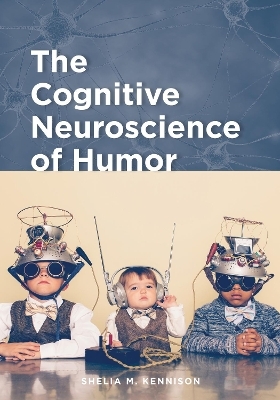
The Cognitive Neuroscience of Humor
American Psychological Association (Verlag)
978-1-4338-3205-5 (ISBN)
In this innovative book, cognitive psychologist Shelia M. Kennison presents a rich overview of research on how the human brain works when processing humor, drawing on the new and sophisticated brain‑imaging technologies that have enabled researchers and health professionals to expand their knowledge about how the brain works under different conditions.
Kennison examines how humor is involved in cognition and memory, human development, and overall mental and physical health.
Studies show that comprehending humor involves numerous regions throughout the brain and leads to physiological changes in the brain and body, which are beneficial for health. In contrast, humor deficits are observed in cases of normal aging, brain damage resulting from traumatic brain injury or disease, and developmental disorders such as autism spectrum disorder.
Readers will gain a fundamental understanding of the biological basis of humor.
Shelia M. Kennison is Professor of Psychology at Oklahoma State University. She earned her PhD in cognitive psychology from the University of Massachusetts at Amherst and bachelor’s degree in psychology and linguistics from Harvard University. She is a fellow of the American Psychological Association and the Psychonomic Society. Her research interests include humor, language processing in monolinguals and bilinguals, and individual differences in verbal and physical risk-taking. She has published numerous research articles. Her previous books include the textbooks An Introduction to Language Development and Psychology of Language: Theory and Applications. She lives in Perkins, Oklahoma. Visit http://sheliakennison.wix.com/cognitivesciencelab and follow @skennison on Twitter.
List of Tables and Figures
Preface
Acknowledgments
Introduction
1. Theories and Early Methodologies
Theoretical Considerations
Early Methodologies in the Cognitive Neuroscience of Humor
Summary
2. Abnormal Humor Processing Due to Brain Aging, Injury, and Degeneration
Humor Processing in Older Adults
Humor Processing Following Brain Damage
Humor Processing in Degenerative Brain Diseases
Pathological Laughter: When Laughter and Mirth Occur Without a Triggering Event
Summary
3. Electroencephalography Studies of Humor Comprehension
Overview of Electroencephalography Methodology
Early Electroencephalography/Event-Related Brain Potential Studies of Humor Comprehension
The Three-Stage Model of Humor Comprehension
Summary
4. fMRI Studies of Humor
Overview of the fMRI Methodology
Early fMRI Studies of Humor Comprehension
fMRI Evidence for a Three-Stage Model of Humor Comprehension
Summary
5. Brain Stimulation Studies of Laughter, Mirth, and Humor Processing
Electrical Brain Stimulation
Deep Brain Stimulation
Transcranial Brain Stimulation
Summary
6. The Development of Humor in Typical and Atypical Individuals
Mirth, Smiling, and Laughing in Infants
Humor Development in Young Children
Humor in Atypical Development
Summary
7. Individual Differences in Humor
Gender Differences
Differences in Social Status
Personality Differences
Ability: Professional Versus Novice Comedians
Humor and Heredity
Summary
8. The Effects of Humor on the Mind and Body
Humor and Health
Physiological Effects of Humor
The Effectiveness of Humor Interventions
Summary
9. Evolutionary Perspectives on Humor
Smiling, Laughing, and Playing Across Species
Evolutionary Advantages of Humor
Evolutionary Changes in Humor-Related Brain Regions
Summary
10. Future Directions
A Neural Signature of Humor
Future Directions in Health Research
Future Directions in Cross-Cultural Differences Research
Future Directions in Research on Education and Training
Closing Remarks
Glossary
References
Index
About the Author
| Erscheinungsdatum | 02.07.2020 |
|---|---|
| Verlagsort | Washington DC |
| Sprache | englisch |
| Maße | 178 x 254 mm |
| Themenwelt | Geisteswissenschaften ► Psychologie ► Allgemeine Psychologie |
| Geisteswissenschaften ► Psychologie ► Biopsychologie / Neurowissenschaften | |
| Geisteswissenschaften ► Psychologie ► Sozialpsychologie | |
| Geisteswissenschaften ► Psychologie ► Verhaltenstherapie | |
| ISBN-10 | 1-4338-3205-4 / 1433832054 |
| ISBN-13 | 978-1-4338-3205-5 / 9781433832055 |
| Zustand | Neuware |
| Haben Sie eine Frage zum Produkt? |
aus dem Bereich


